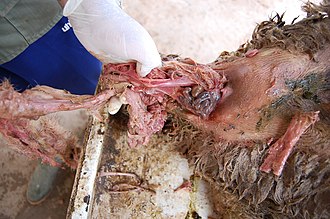Strophosomia

Strophosomia is a genus of beetles belonging to the family Curculionidae, which is known for its wide array of species commonly referred to as weevils. This genus comprises several species, many of which are significant in the context of agriculture due to their impact on crops. The members of Strophosomia are typically small to medium-sized beetles, characterized by their elongated snouts and robust bodies, traits common among weevils. These beetles are primarily found in Europe and Asia, where they inhabit various environments ranging from agricultural fields to natural vegetation.
Description[edit]
The beetles of the genus Strophosomia exhibit the typical weevil form, with a distinctive elongated snout or rostrum, which they use to bore into plant material for feeding and oviposition. The body is generally robust and oval in shape, with sizes varying among species. They possess a hard exoskeleton, which can vary in color from brown to black, sometimes with patterns or spots. The antennae are bent and situated partway along the snout, a feature that is characteristic of the Curculionidae family.
Ecology[edit]
Strophosomia species play a dual role in their ecosystems. On one hand, they act as pests in agricultural settings, causing damage to a wide range of crops by feeding on leaves, stems, and roots. On the other hand, they are part of the natural biodiversity and serve as a food source for various predators, contributing to the ecological balance.
The lifecycle of Strophosomia beetles involves several stages: egg, larva, pupa, and adult. The females lay their eggs in the soil or within plant tissues, depending on the species. The larvae, which are typically legless and grub-like, feed on plant roots or internal tissues, while adults tend to feed on the external parts of plants. This feeding behavior can lead to significant crop loss, particularly in root vegetables and grains.
Economic Importance[edit]
Several species within the Strophosomia genus are considered agricultural pests due to their feeding habits. They can cause considerable damage to crops by reducing yield and quality, which in turn can lead to economic losses for farmers. Management of Strophosomia populations in agricultural settings often involves integrated pest management (IPM) strategies, combining biological control, chemical treatments, and cultural practices to minimize damage and control beetle populations.
Species[edit]
The genus Strophosomia includes a number of species, some of which are:
- Strophosomia melanogramma
- Strophosomia crassipes
- Strophosomia capitata
Each species has its own specific habitat preferences, life cycle, and impact on agriculture, necessitating tailored approaches for management in affected areas.
Conservation[edit]
While some species of Strophosomia are considered pests, it is important to approach their management with consideration for the overall ecosystem. Overuse of chemical pesticides can have detrimental effects on non-target species and the environment. Conservation efforts focus on maintaining biodiversity while managing pest populations through sustainable practices.
Ad. Transform your life with W8MD's Budget GLP-1 injections from $75


W8MD offers a medical weight loss program to lose weight in Philadelphia. Our physician-supervised medical weight loss provides:
- Weight loss injections in NYC (generic and brand names):
- Zepbound / Mounjaro, Wegovy / Ozempic, Saxenda
- Most insurances accepted or discounted self-pay rates. We will obtain insurance prior authorizations if needed.
- Generic GLP1 weight loss injections from $75 for the starting dose.
- Also offer prescription weight loss medications including Phentermine, Qsymia, Diethylpropion, Contrave etc.
NYC weight loss doctor appointmentsNYC weight loss doctor appointments
Start your NYC weight loss journey today at our NYC medical weight loss and Philadelphia medical weight loss clinics.
- Call 718-946-5500 to lose weight in NYC or for medical weight loss in Philadelphia 215-676-2334.
- Tags:NYC medical weight loss, Philadelphia lose weight Zepbound NYC, Budget GLP1 weight loss injections, Wegovy Philadelphia, Wegovy NYC, Philadelphia medical weight loss, Brookly weight loss and Wegovy NYC
|
WikiMD's Wellness Encyclopedia |
| Let Food Be Thy Medicine Medicine Thy Food - Hippocrates |
Medical Disclaimer: WikiMD is not a substitute for professional medical advice. The information on WikiMD is provided as an information resource only, may be incorrect, outdated or misleading, and is not to be used or relied on for any diagnostic or treatment purposes. Please consult your health care provider before making any healthcare decisions or for guidance about a specific medical condition. WikiMD expressly disclaims responsibility, and shall have no liability, for any damages, loss, injury, or liability whatsoever suffered as a result of your reliance on the information contained in this site. By visiting this site you agree to the foregoing terms and conditions, which may from time to time be changed or supplemented by WikiMD. If you do not agree to the foregoing terms and conditions, you should not enter or use this site. See full disclaimer.
Credits:Most images are courtesy of Wikimedia commons, and templates, categories Wikipedia, licensed under CC BY SA or similar.
Translate this page: - East Asian
中文,
日本,
한국어,
South Asian
हिन्दी,
தமிழ்,
తెలుగు,
Urdu,
ಕನ್ನಡ,
Southeast Asian
Indonesian,
Vietnamese,
Thai,
မြန်မာဘာသာ,
বাংলা
European
español,
Deutsch,
français,
Greek,
português do Brasil,
polski,
română,
русский,
Nederlands,
norsk,
svenska,
suomi,
Italian
Middle Eastern & African
عربى,
Turkish,
Persian,
Hebrew,
Afrikaans,
isiZulu,
Kiswahili,
Other
Bulgarian,
Hungarian,
Czech,
Swedish,
മലയാളം,
मराठी,
ਪੰਜਾਬੀ,
ગુજરાતી,
Portuguese,
Ukrainian
